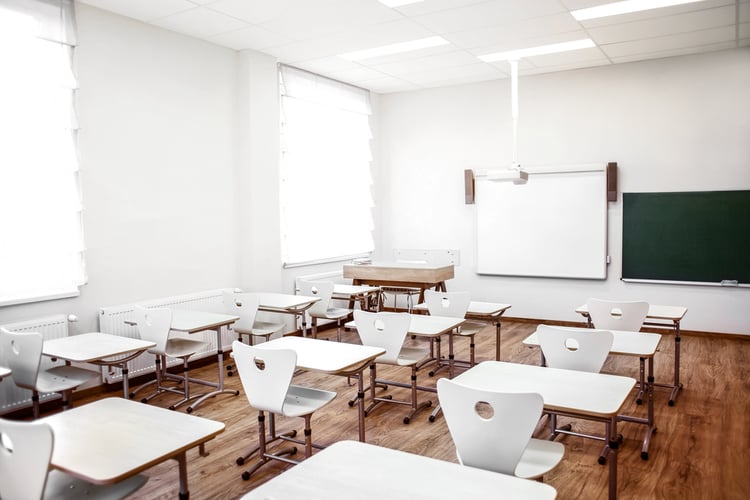New Jersey Launches $180M Grant Program for Schools & Small Businesses

HVAC systems are responsible for the largest share of energy consumption in most buildings, and indoor air quality also depends on them. However, many buildings have inefficient HVAC systems that don’t provide adequate ventilation and temperature control. The high cost of upgrading an HVAC system is a major barrier, especially in underserved communities and the affordable housing sector.
The New Jersey Board of Public Utilities announced a $180 million grant program for schools and small businesses, which has the goal of improving energy efficiency and air quality. The program is largely focused on HVAC improvement, and it will dedicate at least 75% of its funding to underserved communities. Plumbing upgrades that contribute to water conservation are also eligible, along with UV air disinfection systems that are installed as part of an HVAC upgrade.
Reliable HVAC systems make indoor spaces healthier and safer, especially when dealing with a global pandemic like COVID-19. New Jersey’s new incentive program not only makes buildings more efficient, but also less vulnerable to infectious diseases.
How the NJBPU Will Distribute Its $180M Energy Grant Budget

The incentive program is officially called the Schools and Small Business Energy Efficiency Stimulus Program. The NJ Board of Public Utilities has published separate guides for HVAC systems and for all other upgrades (including plumbing):
- School and Small Business Ventilation and Energy Efficiency Verification and Repair Program (SSB-VEEVR)
- School and Small Business Noncompliant Plumbing Fixture and Appliance Program (SSB-NPFA)
Under the HVAC program, schools and small businesses can apply for an assessment and maintenance grant, or a system upgrade grant. When an existing HVAC system cannot be upgraded according to current ventilation and filtration standards, the applicant is eligible for a larger incentive to install new equipment.
The NJ Board of Public Utilities has provided a breakdown of how much funding is available by building type (school or small business) and by program:
|
Program and Building Type |
Underserved Communities |
Not in Underserved Communities |
|
HVAC Program, Schools |
$75,937,500 |
$25,312,500 |
|
HVAC Program, Small Business |
$25,312,500 |
$8,437,500 |
|
Plumbing Fixtures and Appliance Program, Schools |
$25,312,500 |
$8,437,500 |
|
Plumbing Fixtures and Appliance Program, Small Business |
$8,437,500 |
$2,812,500 |
|
Total |
$135,000,000 (75%) |
$45,000,000 (25%) |
A large part of the budget ($101,250,000) is for school districts who apply for the HVAC program, and especially those in underserved communities. Since 2020, ASHRAE has been providing guidance on how to design HVAC systems that minimize the risk of getting an infectious disease like COVID-19. Their guidance focuses on three main areas:
- Using as much outdoor air ventilation as possible.
- Upgrading air filters to at least a MERV 13 rating.
- Adding ultraviolet germicidal irradiation (UVGI) systems to HVAC systems.
All three measures are considered in the HVAC program (SSB-VEEVR), and eligible for funding. The program allows filter ratings below MERV 13 when the existing installation is not compatible, but applicants must use the highest possible rating. UVGI systems are eligible when installed as part of an HVAC upgrade, but separate UV air purifiers are not covered. HVAC projects that get funding must also meet the ventilation requirements of ANSI/ASHRAE Standard 62.1-2019.
Demand controlled ventilation (DCV) systems can be used to save energy, but they must be adjusted to a CO2 setpoint of 800 ppm or lower. Any DCV system that cannot reach a CO2 level below 1,100 ppm must be disabled while the NJ state COVID-19 restrictions remain in effect. Since DCV systems save energy by reducing airflow, they must be configured above a minimum ventilation rate that will not increase the risk of infection.
What Is the Grant Limit for Each School District or Small Business?

To make sure that many school districts and small businesses participate, the NJ energy grant program has a limit per applicant. Each Board of Education (BOE) can receive up to $5 million in funding, and each small business can receive up to $500,000.
- Schools and small businesses can combine incentives from both subprograms, but the total amount per participant cannot exceed these limits.
- Depending on program participation, the NJBPU can increase or decrease these limits.
The grant per project is also limited to 75% of total costs, but applicants can combine the grant with other incentives from NJ Clean Energy and local utility companies. In other words, it’s possible for a school or small business to get 100% funding, by using other incentive programs along with the SSB-VEEVR or SSB-NPFA. However, even if a project gets only the 75% grant, the payback period of energy upgrades becomes four times shorter.
The new energy grant program from the NJ Board of Public Utilities provides an excellent opportunity for schools and small businesses with outdated HVAC systems. With an incentive that covers 75% of their costs, the financial return of an HVAC upgrade is much more attractive.

Michael Tobias
Michael Tobias, the Founding Principal of NY Engineers, currently leads a team of 150+ MEP/FP engineers and has led over 4,000 projects in the US
Join 15,000+ Fellow Architects and Contractors
Get expert engineering tips straight to your inbox. Subscribe to the NY Engineers Blog below.
